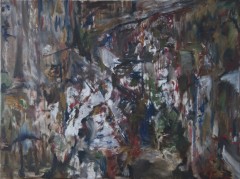Fiction Erik Hanson — March 29, 2011 14:11 — 4 Comments
Routine – Erik Hanson
Monday I arrive at work to see Steve standing next to the window looking out rather than sitting at his desk. His face is drawn tight. I drop my things off in my cubicle and ask him if anything is wrong.
“I just saw someone run out the door and down the street,†he says, gesturing with his coffee mug in the direction they went. The rising steam sways with the motion.
The view from the window looks almost straight down on one of the two main entrances. The sidewalk is wide and a modest canopy extends from the building, the end of it just visible from our angle on the third floor. There is no movement other than the early morning traffic.
“I don’t see anything,†I say, but Steve continues to look out the window.
“Have you checked email yet?†he asks. “Go check.â€
I log in to the internal server to be greeted by the usual Monday morning load. I scroll through and am just about to ask Steve what I’m looking for when I see a subject line that reads, “I can’t do it anymore,†and click it.
Date: Mon, 26 Jul 2010 06:36:42 -0400
Message-Id: <201007281307.o6R3IgEq025985@achilles.cityadvanta.com>
To: branch1134_all-depts@cityadvanta.com
Subject: I can’t do it anymore
MIME-Version: 1.0
Content-type: text/html; charset=iso-8859-1
From: triley@cityadvanta.com
Reply-To: triley@cityadvanta.com
I come to work every day. I’m on time for work every day. I’m good at my job, but I know anyone can do it with minimal training. My work doesn’t challenge me, and I’ve been stuck in the same position for far too long with little or no recognition. Instead, I sit by and watch mediocrity get rewarded day after day and still I sit, staring at my ceiling. Earth is over 4.5 billion years old, and despite the dominance our species has attained on this planet, our civilization’s footing slipped once. But we were lucky. We bounced back. Now we’ve become so advanced that we think making our jobs easier is progress, but no one wants to work anymore because it’s still too hard. No one wants to think. No one wants to enjoy taking their time anymore. Everyone wants instant results. Everyone wants numbers.
We’re slipping into another Dark Ages, but this one will be worse. I can’t stand to see it happen. I won’t be a part of it any longer. You all deserve what’s coming to you.
“Christ,†I say and read it again. “Riley sent this to the entire company?â€
“No, only to the building,†Steve says from the window, “but I don’t think how many people received it makes much of a difference.â€
I seem to recall a Riley from the marketing department but realize I don’t have any idea what he looks like and stand up at my desk to scan the office. “Riley hasn’t been here today, has he?†I ask, and Steve shrugs.
“The timestamp says he sent it about half an hour before security unlocks the doors.â€
There are a few clusters of people speaking in hushed tones. The blinds are open in the project manager’s office, and although I can’t hear through the thick glass, I can see that he and two other men are exerting themselves, speaking in loud voices and gesturing frantically—one has taken off his jacket. His administrative assistant is on the phone and her face appears flushed. Someone else pops up into view from three cubicles down and quickly disappears back behind the wall once she sees that I’ve noticed her.
I can’t tell if this is normal or not.
Steve’s cubicle borders mine.  Raymond used to be around the corner from us, but he transferred to accounting a few months ago; I know he doesn’t like to be called Ray because it doesn’t say Ray on his birth certificate—and he’s been asked so many times if everyone loves him that he might break. We haven’t seen him much since the move. Leslie was placed into Raymond’s old spot before his chair had a chance to cool. She was a graphic designer on temporary contract, but when that expired she had to go and the cubicle has yet to be reassigned. Aside from those three, I don’t know very much at all about the people who work here. I can’t help but wonder who would notice if I didn’t show up one day.
“Which way did you say the runner went?†I ask, and Steve gestures again with his mug. “Do you think it was Riley?†I say, “Did it look like Riley?†but Steve stares out the window in silence. I walk over to stand next to him, and together we watch the sidewalk near the entrance.
4 Comments
Leave a Reply
The answer isn't poetry, but rather language
- Richard Kenney




This is a really well crafted story.
Thanks, Herb. I appreciate the comment.
Well done Erik! Can’t wait to read more of your work!
Your work is excellent, as always. Sticks in my brain like an icepick.